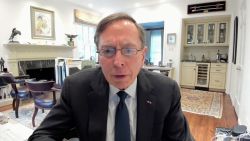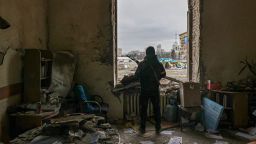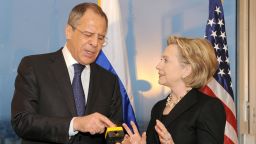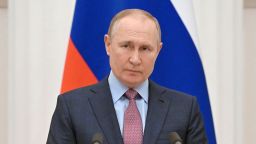Editor’s Note: Frida Ghitis, (@fridaghitis) a former CNN producer and correspondent, is a world affairs columnist. She is a weekly opinion contributor to CNN, a contributing columnist to The Washington Post and a columnist for World Politics Review. The views expressed in this commentary are her own. View more opinion on CNN.
The moment was extraordinary. In an age of profound divisions, the world stood almost single-mindedly united in chastising Russia’s assault on Ukraine.

In an emergency session at the United Nations Wednesday, a resolution denouncing Russian President Vladimir Putin’s invasion of Ukraine, was approved by a vote of 141 to 5, with 35 countries abstaining. When the tally was announced, the chamber burst into a spontaneous standing ovation. It was the most resounding evidence of how Putin has unwittingly advanced the causes he opposes with his assault against Ukraine.
If the contest of our times is one pitting democracies against autocracies – and I believe it is – Putin’s campaign is making the case for democracy, despite his best efforts.
The war against Ukraine is only a few days old, but already Russian President Vladimir Putin has amassed a stunning series of historic achievements – all of them precisely the opposite of what he might have hoped to accomplish.
The conflict is still raging, and Putin may yet turn the tide of an invasion in which his forces have struggled, but much of the damage he has done to his cause – much of what he has done to clarify the principles of democracy, self-determination and global solidarity, and to strengthen the very ideas, organizations and countries Putin tried for decades to undermine – will carry on regardless of his invasion’s ultimate outcome.
From the United States to NATO to the European Union, Russia’s unprovoked assault on its neighbor sparked unqualified revulsion, defended only by a smattering of autocrats, with even some of them hesitating to give their full support to the attack.
Putin gave the world a rare moment of moral clarity. The crisis he created presented us with the real-life dangers of unrestrained autocracy, and a very tangible demonstration of the importance of democracy, freedom and self-determination. Rights that are so often seen as lofty, ethereal concepts suddenly became palpable when Putin tried to steal them from the Ukrainian people.
And Putin’s assault gave a renewed sense of mission to organizations whose stated mission is to preserve peace, security and democracy.
In the United States, which has suffered in recent years from the dangerous virus of political polarization – aggravated by Moscow’s interference – Russia’s attack created an uncommon upswelling of near-unanimity. A CNN poll found upward of 80% of Americans backing sanctions to punish and pressure Russia, with equal majorities of Democrats and Republicans aligned to say the US should do even more.
The sentiment was replicated around the world, with mass demonstrations and concrete measures taken not just by governments, but by private companies. Major corporations have decided to take a principled stance, even at high financial cost.
At the United Nations General Assembly, representatives of 193 countries gathered for an emergency session – the first of its kind in 40 years – to debate a resolution deploring Russia’s “unprovoked armed aggression.”
The UNGA’s president, Abdullah Shahid of the Maldives, called the body “the collective conscience of humanity.” And humanity spoke. Speaker after speaker rose to condemn Russia’s aggression. Just a few dared defend it. Even China, one of Putin’s only allies, called for respecting international borders.
Ukraine’s envoy Sergiy Kyslytsya warned, “If Ukraine does not survive, international peace will not survive … If Ukraine does not survive, we cannot be surprised if democracy fails next.”
Canada’s Ambassador Bob Rae, who like dozens of his peers decried Russia’s actions, addressed the Russian people, telling those who have dared challenge Putin with antiwar protests, “We see you and we hear you,” and telling the Russians that their president, who has caused this crisis, “sorely miscalculated,” by ignoring the democratic spirit of the Russian people. It was a reminder of how this disaster could upend Putin’s hold of his own country.
Russia’s representative repeated the false pretexts for this war, claiming Russia is only defending itself from Ukraine’s threat.
Putin’s war has turned the Ukrainian people’s courageous defense of their independence and their democratic choices into an inspiration for their rest of the world. By attacking and claiming they’re not a real nation, he stoked Ukraine’s sense of nationhood and patriotism.
If Putin expected the West to be divided, NATO to stumble, the European Union to be paralyzed, he must be as surprised as the rest of the world by the global resolve he ignited.
NATO had been disparaged as “obsolete,” and “brain-dead,” but Putin has infused it with new purpose.
Its most hesitant members, the ones closest to Moscow until now, have thrown their full support to resisting and countering Putin’s aggression. Turkey is blocking access to the Mediterranean from the Black Sea to warships, including from the Russian Navy.
Germany, most at risk from losing Russian fuel, seems transformed.
After multiple US presidents tried to pressure Berlin to raise its defense spending to the 2% of GDP required by NATO rules, it was Putin who made it happen. Chancellor Olaf Scholz declared, “Feb. 24, 2022 marks a historic turning point,” referring to the date of the invasion. He announced Germany will immediately raise defense spending above 2% and speed development of non-Russian gas alternatives.
Eastern European autocrats, including Hungary’s Prime Minister Viktor Orban, a favorite of right-wing provocateurs, and the Czech Republic’s President Milos Zeman, disparaged by his critics as the “servant of the Kremlin,” expressed alarm and revulsion at Putin’s actions. Zeman declared, “It’s necessary to isolate a lunatic…
Orban, whose links to the EU have frayed in recent years, was unequivocal. “Together with our European Union and NATO allies,” he said, “we condemn Russia.”
Putin managed to remind everyone, especially his neighbors, about why they joined NATO. For people everywhere, but especially in countries that were once dominated by the Kremlin, it was an unsettling reminder that their freedoms are not guaranteed.
In the process, Putin has branded himself as a global outlaw, possibly a war criminal. Moral clarity is always useful.
In the past, Putin’s has been able to overcome Western sanctions by counting on the greed of Western investors. But the private sector found his actions just as abhorrent. It’s not often one sees private firms, driven by profits, foregoing billions of dollars to take a moral stand.
Putin likely expected his military would secure a quick victory, then Russia would coast over a wave of sanctions by exploiting divisions in the West, investors’ greed and support from other autocrats. Russians are already paying the price for his miscalculation.
Get our free weekly newsletter
As his forces push against a Ukraine that is more united than ever, the world – East and West – has been reawakened to civilizations’ fundamental values. Putin has reminded everyone that national borders should be sacrosanct, and that everything we take for granted – not just our freedoms, but the basic assumption that when we wake up in the morning our world will not have been turned upside down by the whims of a dictator – depends on respect for principles that must be defended.
The resolve of the international community – of the people of the world – will be tested if this conflict continues much longer, and especially if Putin succeeds. The sanctions against Russia, the obstacles on its exports, it all may amount to new hardship on the people who now support Ukraine’s struggle and oppose his aggression. The coming days, weeks and months may well challenge everyone’s determination and strength of character.
For now, Ukraine is doing the heavy lifting, but the vast majority of the world is standing in solidarity, understanding that Ukraine’s fight is everyone’s. That’s quite an accomplishment for Vladimir Putin; not one he hoped to achieve.
This article has been updated to reflect the latest news.



















